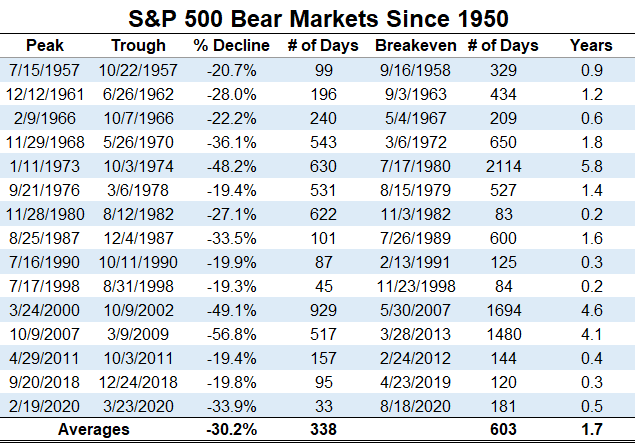No, I’m not calling you a dummy. But if you’re panicking about the stock market, here’s the easy primer you need to chill your ass out.


The NASDAQ 100 is officially in a bear market. 20% drop is the threshold. The S&P 500, Russell 3000, and Dow Jones aren’t quite there yet.
But for all intents and purposes, we’re in a bear market. If you’re younger than ~35, this is your first one as an investor (I don’t count the COVID crash, and both 2011 and 2018 barely dipped into bear territory). If you’re younger than 45, this might be your first bear market with serious assets on the line.
Since bear markets are new to many of us, let’s talk some facts about prior bear markets.
How Often, How Long, and How Bad Are Bear Markets?
Huge hat tip to Ben Carlson for this great chart.

This chart answers all three questions. How often, how long, and how bad bear markets get.
The average bear market takes about 1 year to hit bottom, and then about 1.7 years to fully recover.
The last 15 bear markets have occurred at a frequency of once every four years.
And the average drawdown from the previous top is about 30%.
In other words – everything happening right now is perfectly normal.
What Causes Bear Markets?
Every blogger needs to use that famous opening of Tolstoy’s Anna Karenina at least once. It’s a rule.
Happy families are all alike; every unhappy family is unhappy in its own way.
Anna Karenina, by Tolstoy
For bear markets, the feeling of a 20% drop is universally cruddy. But the causes of bear markets are unique in their own ways.
This bear market has been triggered by two main factors (though you could argue the two factors are closely related).
- The Federal Reserve is tightening monetary policy in response to inflation, thus reducing optimism about future corporate earnings.
- We’re suffering withdrawal after a decade of quantitative easing and two years of COVID stimulus.
Previous bear markets have been triggered by stock bubbles (2000), irresponsible Wall Street practices (2008), pandemic (2020), and other (mostly) economic reasons. This bear market is being caused by monetary policy.
Should I ____ With My Investments?
Readers and clients are asking lots of questions right now.
If their question involves taking evasive action, the answer is most likely no.
You shouldn’t…
- Panic sell
- Try to “time the bottom”
- Alter your investment philosophy
- Watch too much news
- Feel overly emotional
However, you should…
- Stay patient
- Zoom out
- Keep your long-term plans
- Stay agnostic
- Rebalance your portfolio per a pre-determined schedule
I hope I’ve done a good enough job on The Best Interest that you would resist the first list and embrace the second.
The advice above assumes you have a balanced, diversified, broad-based portfolio. If instead, you YOLO’d into AMC and Zoom, I feel for you.


Some stocks never recover. The 2000 Dot Com bubble has many terrific examples of that. The market as a whole, however, has always bounced back.
So if you’ve lost 75% of your portfolio on single stock picks, that sucks. But there’s a small silver lining.
That loss was your tuition at the Real School of Investing. It’s a place that teaches life-long lessons. I hope you’re able to recover and chart a new investing course.
What’s Next?
What’s next from the market? Up, down, sideways. Who knows? Certainly not me.
But on a personal level? I’m going to keep buying. Slow and steady, at regular intervals. I invest twice a month via my employer’s 401(k). I invest once more per month via my Roth IRA. The market is giving me lower prices, and I’m buying.
By the time I start selling my stocks (~25 years), this bear market will be a distant memory.
That’s it. That’s a simple primer on the current bear market.
What other questions do you have about this bear market?
Thank you for reading! If you enjoyed this article, join 8000+ subscribers who read my 2-minute weekly email, where I send you links to the smartest financial content I find online every week.
-Jesse
Want to learn more about The Best Interest’s back story? Read here.
Looking for a great personal finance book, podcast, or other recommendation? Check out my favorites.
Was this post worth sharing? Click the buttons below to share!